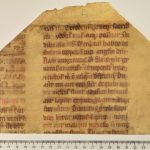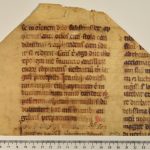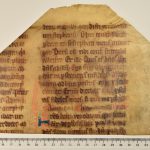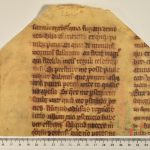The fragments F 328a and 328b (fragments from the cover) form a closely coherent group. Each of the four fragments removed from two host books belong to the Sanctorale part of the once two volume Breviarium Notatum Strigoniense (henceforth BNS) written in the second half of the 13th century, one of the most important plainchant sources from medieval Hungary. The first volume of the codex, containing chants and texts of the Temporale, is kept in the Strahov Library in Prague (Royal Canonry of Premonstratensians at Strahov) under the shelfmark DE I 7. The manuscript is accessible in a facsimile edition prepared by Janka Szendrei, Breviarium notatum Strigoniense (Musicalia Danubiana Vol. 17. Budapest: Institute for Musicology of the Hungarian Academy of Sciences, 1998). Online access: http://www.manuscriptorium.com/apps/index.php?direct=record&pid=AIPDIG-KKPS__DE_I_7______05X6099-cs).
The breviarium notatum ordinarily was not a book in practical use in the Middle Ages. The name indicates a more thesaurus-like manuscript, incorporating texts and melodies of the Divine Office. This type of liturgical book was chiefly aimed to be a source for the books they copied: antiphonals, breviaries with text only, lectionaries etc.
The host books of the fragments belonged originally to the Zagreb chapter’s library; they got their cover made from codices there, at the end of the 17th century. Perhaps a university student from Zagreb, studying in Nagyszombat/Trnava left them to the library of the Pázmány University, functioning at that time in Nagyszombat. The host books were likely moved to Buda in the 18th century with the rest of the library. (See: Gábriel Szoliva OFM, “Secunda pars breviarii. A 13. századi esztergomi breviárium kottás szanktoráléjának rekonstrukciója felé” in Magyar Könyvszemle 135 (2019/3), 305–328, in Hungarian with English sumary; Arti Musices, in English with a Croatian summary). The University Library keeps further codex fragments, once covering the books of the chapter library of Zagreb, see Mezey 1983, U. fr. l. m. 23-27.
Fol. 1 contains parts of the Office of St Agnes. Notation is also visible on it from the main scribe of the BNS: mature 13th century Esztergom neumes drawn with one movement, with fluent lines.
Fol. 2 contains parts of lessons for the January feast of Conversio S. Pauli; however the chants are directed here from the apostle’s feast on 30th of July (Commemoratio S. Pauli). Later, the Feast of Conversio got its proper chants in the Esztergom rite; hence this early fragment preserves the archaic state before the introduction of the feast’s new physiognomy. It is likely, that the verses attached to the psalm antiphons, which gave a particular character to the Commemoration, fell out in this secondary function.
Gábriel Szoliva





